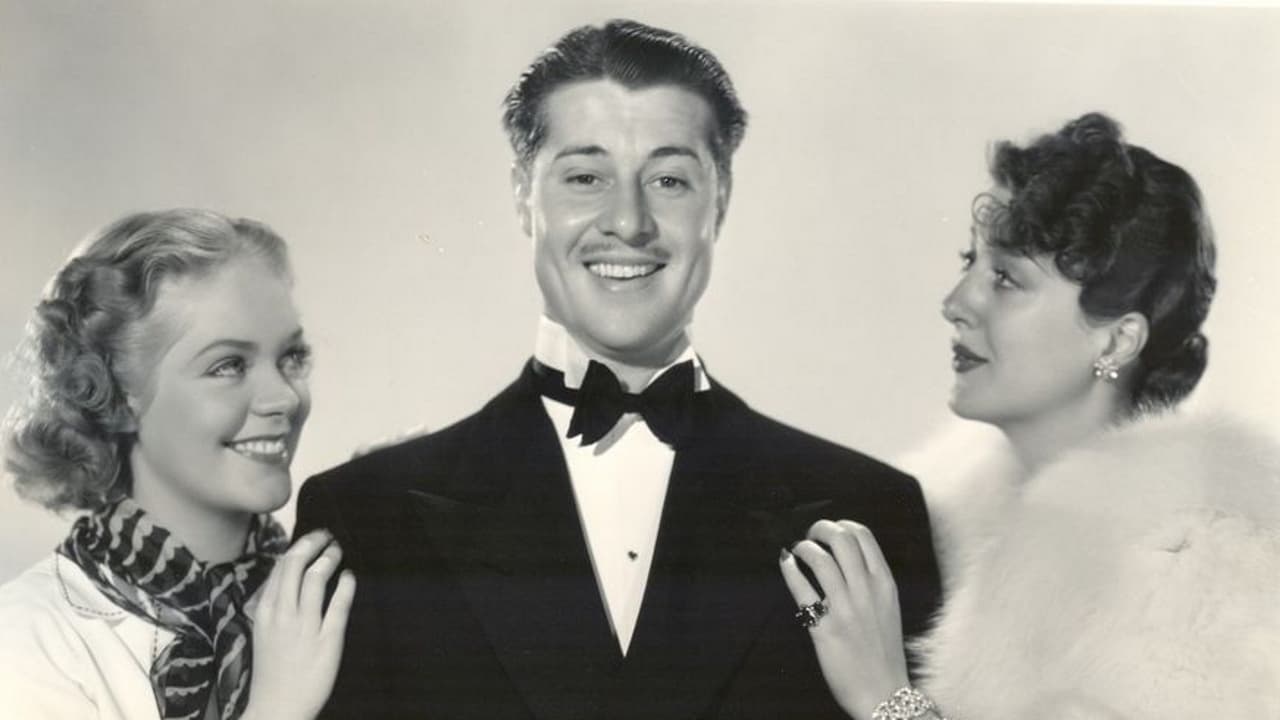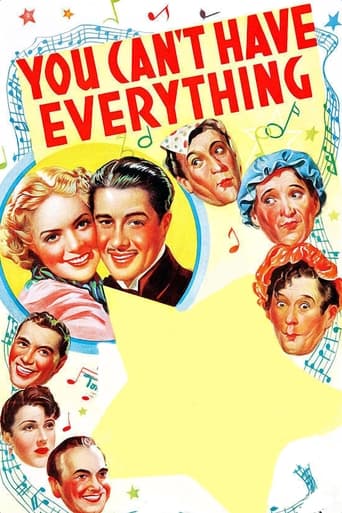

What a waste of my time!!!
... View Moreeverything you have heard about this movie is true.
... View Moreif their story seems completely bonkers, almost like a feverish work of fiction, you ain't heard nothing yet.
... View MoreThe movie is surprisingly subdued in its pacing, its characterizations, and its go-for-broke sensibilities.
... View MoreThat's as in Alice, not Dunaway. But, you'll never know how much you'll love her until you see some of her pre 1940's work when she really was the queen of the Fox musical, filled with more pip and pizazz that the Zanuck studio would when they signed another blonde named Betty Grable. Back then, Alice Faye was pluckier and sexier, not quite like Harlow (as she had been during her earlier days), but certainly tougher, and not so Ann Harding like when they began to make her characters more long suffering.The story here has her as a starving playwright who sings for her supper in an Italian restaurant after revealing she doesn't have money for the two healing helpings of spaghetti she scarfed down. Drunk theatrical producer Don Ameche decides to secretly help her out, with objections from his boss, Charles Winninger, and his socialite stalker, Louise Hovick, aka Gypsy Rose Lee, who claims to be married to him. Ameche's aided by the silly Ritz Brothers, and by chance, Ameche tries to get her to star in his big musical (which she hates) so he can get rid of his pain in the butt diva star, Phyllis Brooks, whom everybody seems to hate. Clara Blandick ("Auntie Em") plays a nasty customer in the music shop in Faye's home town which indicates why she left there in the first place. I'm wondering, however, if there was an opening scene with Faye cut from the film in this provincial hovel of babbity people like Blandick that made her decide to leave in the first place. Hovick/Gypsy is so camp in her deliciously bad acting, but it fits her off screen image.This is the 20th Century Fox musical at its delightful best, with Faye joined by real life husband #1 Tony Martin in the show within the movie scenes. Ameche gets to sing as well, a sign of things to come when he later sent on to become a musical comedy star himself on Broadway. Of course, this has all the formulatic elements that many 1930's and 40's musicals had, but it works here very well. The Ritz Brothers are very funny in a production number about long underwear. The title may be true in life, buy as far as this film is concerned, it couldn't be further from the truth, but that's a good thing.
... View MoreI guess I'm in a minority, but I found the results tepid, at best. The Ritz Brothers have no real act except to bounce around in tandem, and are more annoying than funny. Then too, the production numbers appear cut-rate, certainly not up to anything memorable. I kept hoping we'd get an eccentric styling from bandleader Louis Prima, but no such luck. Maybe he needed Keely Smith to play off of. The plot's boilerplate, but then who tunes into musicals for the plot. It's something about Faye finding her real place in show business, at the same time she and writer Ameche try to find a way to get together.On the other hand, Faye's delightful, sparkling one minute, soulful the next. She really deserved better musical backup. Ameche's lively and a handsome foil for Faye. No wonder they were a natural movie twosome. Their first scene together in the spaghetti emporium is a peach. Too bad the remainder doesn't equal that initial scene. Then there's the amazonian Gypsy Rose Lee who could easily have stolen the movie against someone less compelling than Faye. Too bad Lee didn't make a career of movies; she would have made a heckuva villainess. Nonetheless, in my little book, the musical's mainly for fans of the great Alice Faye, and little more.
... View MoreAlice Faye and Don Ameche were both rather young Fox contract players, both with acting and singing talent. So, it made sense to put them together as the stars of a musical comedy. This was the first of 6 films they made together over the next 5 years, 5 of them musical comedies, although Tyrone Power would usurp Ameche as Alice's main romantic interest in two of them. In terms of music and star power, no doubt the most famous of this series was the Irving Berlin-scored "Alexander's Ragtime Band". As with the often quoted summation of the appeal of the Astaire & Ginger musical team, Ameche gave the Hell's kitchen-bred Alice class, and Alice gave Ameche additional sex appeal. Of course, it was actually more complex than that. Alice was then the more famous to movie goers, having costarred in two Shirley Temple films the previous year, where she got to sing solo or with Shirley. The team of Harry Revel and Mack Gordon composed most of the songs for those films, as well as the present one. While not as memorable as many of Berlin's songs, they are certainly generally adequate in the context of the screenplay. Beginning in 1940, when Harry Warren moved from Warner to Fox, Mack would write the lyrics to some more enduring songs, including Alice's best remembered song: " You'll Never Know", and a number of Glen Miller's hits.Here, we have additional musical and comedic talent in the supporting players. The Ritz Brothers were signed by Fox for the last years of the '30s, and usually were first or second -billed. They permeate this whole film. most viewers today, including me, don't find them terribly amusing. However, as some others have noted, they are at their most tolerable in this film. Who else could carry a musical comedy production about long underwear? They aren't the only featured male trio. The African American gymnastic dance team of Tip, Tap, and Toe are featured in one number. They were one of several AA groups of 2, 3 or 4 gymnastic dancers featured in the occasional musical, long before Michael Jackson. The Nicholas Brothers, no doubt, were featured in the most films. The Four Step Brothers were also impressive in their performances in Universal's "When Johnny Comes Marching Home" (see on You Tube).Gypsy Rose Lee, in one of her few film appearances, is another major character, cast as 'the other woman', trying to hold onto Ameche in the face of his obvious infatuation with Alice's character. Blond Phyllis Brooks takes on the thankless role of Alice's unpleasantly snooty established stage rival. Phyllis comes across as much more appealing in the contemporary Shirley Temple-starring "Rebecca of Sunnybrook Farm", where she was allowed to show that she could sing as well as Alice, and be appealingly sexy, even if she was again 'the other woman'.Veteran vaudeville and film character actor Charles Winninger is given a subdued straight role as the Broadway producer of musicals, and associate of Ameche, not allowing him to exhibit his comedic talent seen in some other films of the '30s and '40s(example: "Pot of Gold"). Noted violin player David Rubinoff is given several opportunities to show his talent. Tony Martin, Alice's new husband, shows off his considerable singing talent in several numbers, albeit without commensurate acting talent. Band leader and singer Louis Prima also gets several chances to strut his stuff. Stiff Arthur Treacher does his usual British butler role. He is probably best remembered for his contributing roles in several Shirley Temple films. The film begins with Alice entering a NYC Italian restaurant, ordering several plates of spaghetti, then announcing that she has no money, and strangely requesting that the waiter call a policeman to arrest her. Why?? The nearby tipsy Ameche offers to pay her bill. She refuses, but it's discovered she has singing talent, in rendering the (so-so) title song. Ameche inquires why she can't get a job as a singer.She replies her ambition is to be a playwright of serious dramas, being a descendant of Edgar Allen Poe. Ameche arranges with Winninger to pay for the rights to Alice's poor play "North Winds", to help further his hoped-for romantic relationship with her, never mind that he already has a serious girlfriend and maybe wife in Gypsy. Gradually, he warms her up to the idea that she could make an excellent lead play actress and singer. However, she backslides periodically, especially when she discovers who he really is, and that her serious drama has been totally redone as a musical comedy. However, as expected, all are smiles at the end, after Winninger points out that, with this success, her future serious plays are more likely to be accepted.The musical productions and fashion walk portions of the film would certainly have benefited by being filmed in 3 strip Technicolor, just recently commercialized. The women are sometimes decked out with outrageously huge ornate headpieces.After the Ritz Brothers' "Long Underwear" production, Tony Martin later warbles the romantic "The Loveliness of You", with accompanying fashion walk. Alice later follows with the jazzy "Danger, Love at Work". Ameche, and later Martin, follow with the romantic "Afraid to Dream", then Alice, with the swing-styled "Please Pardon Us, We're in Love". Martin dominates the romantic singing, and the Ritz brothers the comedy in the final big production: no great shakes. Presently available on a minimalist DVD.
... View MoreDirector Norman Taurog has a witty script and the top musical performers on the Fox lot to direct, and he delivers. The plot is all too familiar and implausible, but the dialogue sparks it. Leads Alice Faye and Don Ameche are at their most charming and natural, and Faye has a couple of solid hit songs. Too bad Ameche wasn't as lucky. The Ritz Brothers have integrated roles in the plot, ample screen time and deliver several excellent numbers. Tip, Tap & Toe wow with a fine eccentric tap number just before the production number (a clinker) at the end of the film. Character comedian Charles Winninger is somewhat wasted in a largely straight role, but Gypsy Rose Lee (billed under her real name, Louise Hovick, gets a break as a playing the snarky "other woman." Tony Martin has fine pipes but comes off a bit smarmy and mannered in his numbers, and Rubinoff on screen is proof why he was better on radio. Phyllis Brooks and Wally Vernon also deliver snappy bits. Definitely one of the better of 20th Century Zanuck's musicals, although he can't resist his cheesily costumed chorus cuties whose talents are best on display without moving or talking. One chorine with a platter on her head traipsed pigeon-toed down a staircase in a Tony Martin number--at first I thought she was Harry Ritz. I'll watch this film again just to see the Ritz Brothers and Tip, Tap & Toe.
... View More